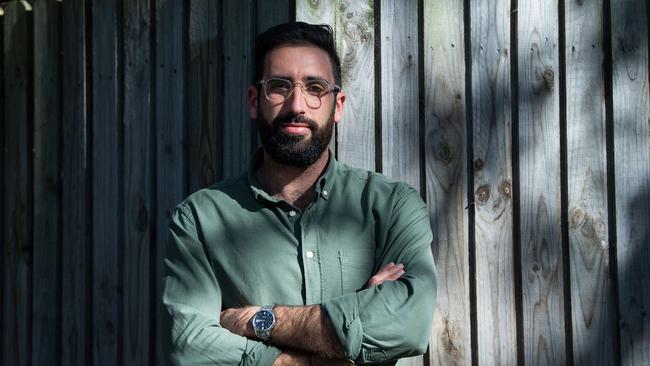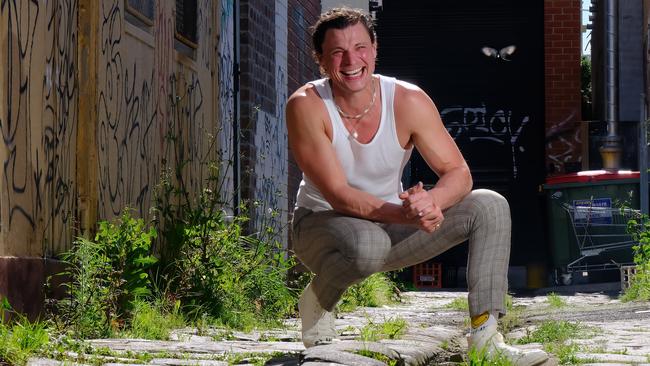‘I still experience hard times’: Konrad Bień-Stephen opens up about mental health
Konrad Bień-Stephen attempted to take his own life in his 20s. He’s speaking up to help others. This World Suicide Prevention Day, Movember asks you to spot the signs of poor mental health, step in and take action.

QWeekend
Don't miss out on the headlines from QWeekend. Followed categories will be added to My News.
Things eventually get better. That’s the message suicide survivor Konrad BieÅ„-Stephen wants you to know.
“Of course I still experience hard times, but I’ve learnt to be open about it,” says Bień-Stephen, a former Bachelorette Australia star and contestant on The Challenge Australia 2022. He revealed his battle with mental health via social media last year.
“I attempted to take my own life in my twenties. I’m ok and have been for some time now. If you are not feeling ok, please talk to someone.”

Tomorrow is World Suicide Prevention Day, and Movember are asking you to do more than just throw in for a fundraiser, like reaching out to the men around you.
Alarmingly, suicide is the leading cause of death for people aged 15 to 44 years in Australia,
and three in four suicides are men, according to the Australian Institute of Health and Welfare. In 2021, 3144 Australian lives were lost to suicide – 2358 of them were men.
And it’s not limited to under 45-year-olds. Research shows that men in their middle years are at serious risk of poor mental health due to compounding life stressors, unemployment, financial distress, relationship breakdowns. Consequently, men aged 45-65 are experiencing
the greatest increase in suicides of any age group.
It’s a mental health crisis that clinical psychologist and Global Director of Men’s Health Research at Movember Dr Zac Seidler wants to spotlight.
“Each year we witness the toll of silent suffering, and it’s obvious that something needs to change,” says Dr Seidler.
“We all have a role to play in preventing suicide, we will only make a dent in these statistics if we all lend a hand and an open ear.”

Spot the signs
Early intervention is key. Stepping in with support – which can be as simple as starting a conversation – can help prevent someone with poor mental health from reaching a crisis point.
Changes in behaviour, even small ones, can be indications of poor mental health and a possible red flag, according to the experts at Movember. Shifts in the norm could be things like not sleeping, eating less or more than usual, forgetting personal grooming, avoiding social situations, missing events, going quiet on social media or messages, being more irritable than usual, or talking about death and dying.
“It starts with recognising the small changes in behaviour in the men around us,” says Dr Seidler.
“Has your mate suddenly gone quiet on the group chat? Is your husband sleeping and drinking more than usual? Don’t brush these off. Instead, use them as a reason to reach out and check-in. It might just save a life.”
For Bień-Stephen, like many struggling with mental health, the signs can be hard to notice.
“A lot of my friends don’t even know that I’m actually a suicide survivor,” he says.
“I never really told too many people because, you know, you worry that people are gonna think you’re crazy, you’re not gonna get a job or whatever reason.”

Time to get talking
If kickstarting a conversation with someone you think might be struggling sounds daunting, there are tools to help. Developed by Beyond Blue, ALEC – Ask, Listen, Encourage action, Check-in – is a four-step approach to help tackle important conversations with men in your life.
Begin by asking open-ended questions. Share your struggles to help destigmatise issues and develop a closer relationship. Move onto listening, avoid assumptions, judgements and the temptation to provide answers.
Importantly, take what’s being said seriously. Next, encourage action – this could include taking care of physical health, as well as mental health, and focusing on how you could provide support. Tap into your wider network of friends, family and medical professionals if you need. Lastly, plan to check-in, which shows that you’re genuinely interested and in their corner if they need you. Knowing there’s help around can make a big difference.
“I’ve just been lucky to have a support network and great friends that have got me through it,” says Bień-Stephen.
“I’ve been comfortable to talk about it to an extent. It’s okay to go through bad times.”

Therapy is excellent
While seeking support and asking for professional help has never been more socially acceptable, it seems sticking with it is a whole other ballgame. According to findings by Movember, 45 per cent of men drop out early after seeking professional help.
To address this unique insight, Movember have launched a world-first video series called What is Therapy?
The five-part comedy series aims to break down common misconceptions around counselling, demystifying the process, and challenging stereotypes. By showing what it entails and how it can make real change in your life, Movember hopes to encourage men to give it a go – and stick with it.
“Therapy comes in so many shapes and sizes, but the exact shape that therapy takes is irrelevant if it provides a space where you can learn to better understand yourself, your strengths and what makes you tick,” says Dr Seidler.
“It’s about developing practical life skills for self-care.”
Learn how to spot the signs and support your friends at movember.com/SpotTheSigns
Where to go for help
If you or someone you know is feeling low, don’t hesitate to reach out using these local support resources.
To speak with someone immediately, contact Lifeline on 13 11 14 or Suicide Call Back Service on 1300 659 467. If life is in danger, call 000 or go directly to emergency services.




